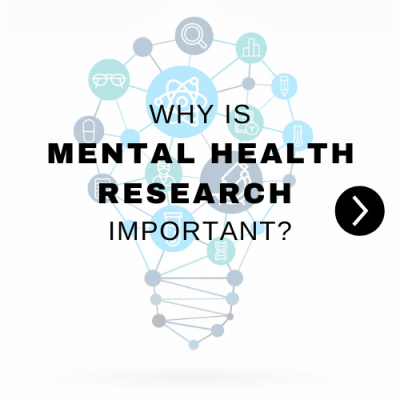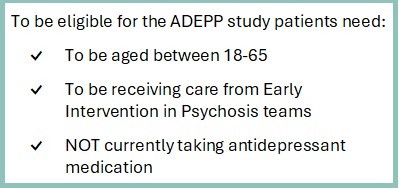|
Visit the link below to find out more about NIHR Portfolio studies: www.
|
Lived experience
CWP aims to bring together the Trust and people with lived-experience of mental illness and learning disabilities (service users, carers and volunteers). This is particularly important when it comes to research. Service users, carers and volunteers are the experts when it comes to their needs. Their ideas about the things that need to be researched are crucial to make sure that research is meaningful and can be applied to the real world.
Take part in research
CWP is currently recruiting patients to a wide range of mental health research studies and drug trials. These are done in collaboration with other NHS Trusts, universities and pharmaceutical companies.
If you would like to participate or have a patient who would like to take part on any of our current studies below, please email cwp.
Alternatively, you can print our Invitation to take part in research leaflet, add your details and post it back to us.
Current studies:
ADEPP
|
ADEPP (Antidepressant for the Prevention of Depression Following First Episode Psychosis) is a randomised control clinical trial which is investigating whether using an antidepressant medication (Sertraline/Lustral) versus placebo improves recovery following first episode psychosis. Around 40% of young people experience a moderate or severe depressive episode in the six months following treatment of first-episode psychosis (FEP). Depression after FEP is the most significant risk factor for suicidal behaviour and completed suicide; 35 out of every 100 patients with FEP will attempt suicide, and completed suicide is most common in these early years of illness. We have recently shown that depression after FEP has a long-term impact on the likelihood of suicidal behaviour, lasting up to 7 years. Depression after FEP also has adverse consequences for social and occupational recovery, quality of life and risk of relapse. Only a minority of patients who experience FEP will achieve full recovery, with up to 70% of people having poor occupational and social functioning even with existing, intensive intervention. The ADEPP study aims to prevent the onset of depression after FEP by using Sertraline/Lustral as a prophylactic antidepressant.
Important note: Referral to this study must be made by the staff from the Clinical Teams or Clinical Studies Officers from the Research Team. If you are a staff member from CWP and would like to refer a participant to this study or just find out more about the study please contact the Research Team (details above). |
|
DPIM - Genetics of Mental Illness
|
DPIM is studying large numbers of people with psychiatric disorders* to compare the frequency of DNA polymorphisms with people who do not have any history of psychiatric disorders. DPIM is investigating responsiveness to drug treatments and test whether genetic polymorphisms can predict who responds to which treatment. Aim: To understand the causes of different psychiatric disorders and to tailor the medication which gives the best response with minimal side effects to each individual.
Important note: the inclusion criteria includes having a confirmed diagnosis of schizophrenia, bipolar affective disorder or schizo-affective disorder (manic or depressive type) AND having capacity to give informed consent. |
DPIM Patient Information Sheet DPIM Healthy Volunteer Information Sheet
|
| OPTICAT (Optimising community C(E)TRs through understanding the experience of people with learning disability and autistic people and investigating their impact on care) |
How do C(E)TRs impact admission to hospital and clinical outcomes for people with a learning disability and/or autistic people who are on the Dynamic Support Register? OPTICAT study team are investigating whether Care (Education) and Treatment Reviews (also called CETRs) help autistic people and people with a learning disability stay out of a mental health hospital and/or have shorter stays in hospital. Currently, there is not enough research/ evidence on if CETRs help autistic people and people with a learning disability stay out of a mental health hospital and have shorter stays in hospital. The study team will monitor participants over a 12-month period to find out if they go into hospital and for how long, how their mental health, behaviour, quality of life is, about any medication, contacts with health services and care or treatment they have had. This is to see if there is a difference in outcomes between people who had a CETR and those who did not. Important note: referral to this study must be made by the staff from the Clinical Teams or Clinical Studies Officers from the Research Team. If you are a staff member from CWP and would like to refer a participant to this study or just find out more about the study please contact the Research Team (details above). |
Opticat website (King's College London)
|
PPiP2 - Pathogenic Antibodies in Psychosis
|
The PPiP2 study aims to investigate the prevalence of autoimmune antibodies in patients with psychosis and identify people with psychosis and anti-neuronal membrane antibodies to take part in the SINAPPS2 trial. Important note: referral to this study must be made by the staff from the Clinical Teams or Clinical Studies Officers from the Research Team. If you are a staff member from CWP and would like to refer a participant to this study or just find out more about the study please contact the Research Team (details above). |
Participation Information Sheet The SINAPPS2 Clinical Trial - Treating psychosis with immunotherapy ? (video) - SINAPPS2 participant and family talking about their experience in the trial SINAPPS Group (YouTube channel) (for Staff) SINAPPS Research Group website (for Staff) -www.sinapps.org. |
|
|
This trial aims to find out how effective a stimulant medication is compared to a non-stimulant medication in patients who have been diagnosed with attention deficit hyperactivity disorder (ADHD) and also have a history of either psychosis or bipolar. Trial will last 12 months. Important note: Referral to this study must be made by the staff from the Clinical Teams or Clinical Studies Officers from the Research Team. If you are a staff member from CWP and would like to refer a participant to this study or just find out more about the study please contact the Research Team (details above). |
|
|
SupporTing pARents and their autistic Children through Anxiety Treatment (STAR-CAT)
|
This is a University of Oxford study to assess a new treatment for anxiety problems in autistic children or children who have screened positive on autism Social Communication questionnaire. Open to children aged 5-12 years. This treatment involves parents working through content on a website with therapist support (over the phone or on a video call) throughout. This treatment is compared to the usual treatment that is currently being offered to treat anxiety problems in autistic children. Important note: Referral to this study must be made by the staff from CAMHS. |
SupporTing pARents and their autistic Children through Anxiety Treatment (STAR-CAT) website
|
STRATCARE-2 (Evaluating the Clinical and Cost Effectiveness of Stratified Care for Depression) |
StratCare-2 is a web-based computerised app which guides psychological therapists on how to assess new patients. The app uses a stratified care model, where patients are matched to the most appropriate treatment for their needs. The study aims to evaluate the longer-term clinical- and cost-effectiveness of AI-driven stratified care versus usual stepped care for people with depression, by following up patients to 18 months after joining the trial. Eligibility: Adult (18+) patients seeking treatment for common mental health problems and who present to Talking Therapies service with case-level depression symptoms on the PHQ-9 measure. Important note: Referral to this study must be made by a Psychological Wellbeing Practitioner in the CWP East Talking Therapies Service. |
StratCare-2 | CTRU | The University of Sheffield
|
Follow-up studies (CWP no longer recruiting) :
For more research opportunities, follow the links below :
Our partners
Our other websites...




























